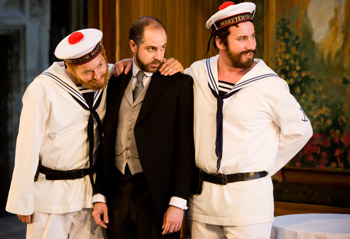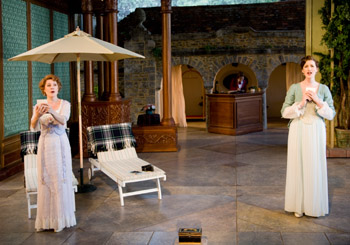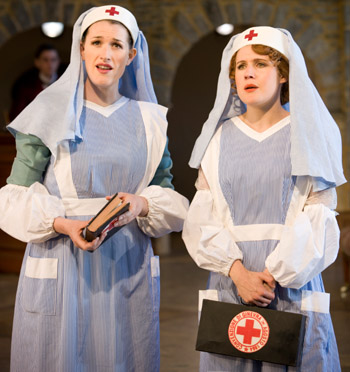June 8, 2008
Last night’s opening performance of Cosi fan tutte left you wondering why anybody bothers to stage operas that aren’t by Mozart – he is just so much better at it than anyone else. Even with a dastardly misogynist story like Cosi fan tutte, which is certainly not calculated to find favour with an enlightened post-feminist audience, the music is so divinely beautiful that you are prepared to forgive pretty much anything. There were moments during the ensemble pieces when you almost felt as if you were pulled up to heaven by the roots of your hair, so angelically thrilling were the voices of Fiordiligi (Erica Eloff, soprano), Dorabella (Anna Stephany, mezzo-soprano), Guglielmo (D’Arcy Bleiker, bass-baritone), and Ferrando (Ashley Catling, tenor).
This is not to excuse the content of the opera. When you find that intelligent opera-lovers have spent a hundred and fifty years either tinkering with it (my favourite tinkering is the one where Despina tells the sisters the whole plot early on, so that they are actually only pretending to fall in love with their disguised fiancés, to teach them a lesson!) or ignoring it, then clearly you have something pretty problematical. Most truthfully did Jane Austen write “the cure of unconquerable passions, and the transfer of unchanging attachments, must vary very much as to time in different people”, but the systematic conning of the sisters into falling in love with what they think are two perfect strangers and abandoning their adored fiancés in the space of a day – let me repeat that – one day – is something that takes a lot of reconciling. You can emphasise in your interpretation that this opera is simply about debunking the silly excesses of romantic love, rather in the way of Shaw’s Arms and the Man; but in the end you can’t get away from the fact that, even though she suffers intense agonies in the contemplation of her betrayal, Fiordiligi swears eternal love and constancy to Guglielmo in the morning, and signs a marriage contract with a mysterious Albanian gentleman in the afternoon. If you have become at all fond of the sisters, this temptation and fall followed by humiliating public exposure is going to hurt, and it’s doubly galling that smug, cynical misogynist Don Alfonso is proved right and wins his bet with the two young men.
Alternatively, you can shrug it off and say it’s all frivolous, all a lovely joke, ha ha ha. But it clearly isn’t; the libretto and especially the music show us people suffering actual shame and pain. Even the worldly-wise Despina, when she understands the depth of Don Alfonso’s duplicity and its consequences, is disgusted at her own part in it. So it is uncomfortable to watch, and the ending, with the girls repentant and the young men accepting, is manifestly implausible and unsatisfactory, exactly like the endings of several of Shakespeare’s comedies. It is all, as modern youth would say, messed up.
But the music… the music conquers all. This production by Garsington Opera is a revival, little varied from its triumphant appearance in 2004, and is simply glorious. Its setting – in the years of the first world war – is rather odd, placing as it does this rather frivolous confection against a backdrop of almost unimaginable horror and pain. However, this year’s version is an absolute triumph. Not only were the four principals divinely wonderful, but Riccardo Novaro was superb as Don Alfonso. He played the part not at all as a genial educator, but as an altogether more sinister, Iago-like figure, unsmiling, inwardly tortured. Here was a man wreaking his revenge for some devastating private wound. And the audience was totally bewitched by the wonderful Teuta Koço as Despina, a worthy successor to Lillian Watson in 2004. She was pert, she was mischievous, she delighted in deceiving her silly mistresses, she animated the whole performance with an irresistible naughty energy – she was a true delight.
One of the really wonderful things about Garsington as a venue is its intimacy. The orchestra is brilliantly contained, no-one has to strain their voices, every word is clear as a bell, and the excellent stage set is gorgeously enhanced by the back of the manor house and its ravishingly lovely flower garden. The audience was truly blessed on Saturday night – despite warnings of rain in the afternoon and evening, it remained clear, fine, warm – a perfect English summer night. As we made our way back to the car park afterwards we crossed the Italian pool, in which illuminated seventeenth century statues, the dark hedge, and the thumbnail moon were all reflected. It was unforgettable. The Garsington Opera will only be staged at Garsington Manor for two more years. It is expensive – though not in comparison with Glyndebourne or Covent Garden – but it is worth every penny. It’s an opportunity that will never come again to see an absolutely first class production in a magically beautiful place. My advice - just do it.
This is not to excuse the content of the opera. When you find that intelligent opera-lovers have spent a hundred and fifty years either tinkering with it (my favourite tinkering is the one where Despina tells the sisters the whole plot early on, so that they are actually only pretending to fall in love with their disguised fiancés, to teach them a lesson!) or ignoring it, then clearly you have something pretty problematical. Most truthfully did Jane Austen write “the cure of unconquerable passions, and the transfer of unchanging attachments, must vary very much as to time in different people”, but the systematic conning of the sisters into falling in love with what they think are two perfect strangers and abandoning their adored fiancés in the space of a day – let me repeat that – one day – is something that takes a lot of reconciling. You can emphasise in your interpretation that this opera is simply about debunking the silly excesses of romantic love, rather in the way of Shaw’s Arms and the Man; but in the end you can’t get away from the fact that, even though she suffers intense agonies in the contemplation of her betrayal, Fiordiligi swears eternal love and constancy to Guglielmo in the morning, and signs a marriage contract with a mysterious Albanian gentleman in the afternoon. If you have become at all fond of the sisters, this temptation and fall followed by humiliating public exposure is going to hurt, and it’s doubly galling that smug, cynical misogynist Don Alfonso is proved right and wins his bet with the two young men.
Alternatively, you can shrug it off and say it’s all frivolous, all a lovely joke, ha ha ha. But it clearly isn’t; the libretto and especially the music show us people suffering actual shame and pain. Even the worldly-wise Despina, when she understands the depth of Don Alfonso’s duplicity and its consequences, is disgusted at her own part in it. So it is uncomfortable to watch, and the ending, with the girls repentant and the young men accepting, is manifestly implausible and unsatisfactory, exactly like the endings of several of Shakespeare’s comedies. It is all, as modern youth would say, messed up.
But the music… the music conquers all. This production by Garsington Opera is a revival, little varied from its triumphant appearance in 2004, and is simply glorious. Its setting – in the years of the first world war – is rather odd, placing as it does this rather frivolous confection against a backdrop of almost unimaginable horror and pain. However, this year’s version is an absolute triumph. Not only were the four principals divinely wonderful, but Riccardo Novaro was superb as Don Alfonso. He played the part not at all as a genial educator, but as an altogether more sinister, Iago-like figure, unsmiling, inwardly tortured. Here was a man wreaking his revenge for some devastating private wound. And the audience was totally bewitched by the wonderful Teuta Koço as Despina, a worthy successor to Lillian Watson in 2004. She was pert, she was mischievous, she delighted in deceiving her silly mistresses, she animated the whole performance with an irresistible naughty energy – she was a true delight.
One of the really wonderful things about Garsington as a venue is its intimacy. The orchestra is brilliantly contained, no-one has to strain their voices, every word is clear as a bell, and the excellent stage set is gorgeously enhanced by the back of the manor house and its ravishingly lovely flower garden. The audience was truly blessed on Saturday night – despite warnings of rain in the afternoon and evening, it remained clear, fine, warm – a perfect English summer night. As we made our way back to the car park afterwards we crossed the Italian pool, in which illuminated seventeenth century statues, the dark hedge, and the thumbnail moon were all reflected. It was unforgettable. The Garsington Opera will only be staged at Garsington Manor for two more years. It is expensive – though not in comparison with Glyndebourne or Covent Garden – but it is worth every penny. It’s an opportunity that will never come again to see an absolutely first class production in a magically beautiful place. My advice - just do it.






